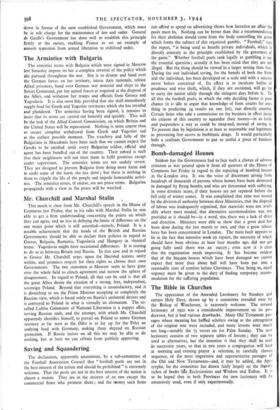Mr. Churchill and Marshal Stalin
This much. is clear from Mr. Churchill's speech in the House of Commons last Friday, that in his talks with Marshal Stalin he was able to get a firm understanding concerning the points on which they can agree, and no less in defining the limits of difference on the' one major point which is still unsettled—namely, Poland. It is a notable achievement that the heads of the British and Russian Qovernments should be able to declare their policies in regard to Greece, Bulgaria, Rumania, Yugoslavia and Hungary in identical terms. Yugoslavia might have occasioned differences. It is ceasing to do so as betweep Britain and Russia. In that case and in regard to Greece Mr. Churchill urges upon the liberated nations unity within, and promises respect for their rights to choose their own Governments. The two statesmen at Moscow seem to have gone over the whole field to clinch agreement and narrow the sphere of disagreement. In regard to Poland, all that can be .said is that all the great Allies desire the creation of a strong, free, independent, sovereign Poland. Beyond that everything is unsatisfactory, and it is disturbing to see the Prime Minister accepting so completely the Russian view, which is based solely on Russia's unilateral desires and is conveyed to Poland in what is virtually an ultimatum. The so- called Lublin Committee of National Liberation is a puppet affair, serving Russian ends, and the attempt, with which Mr. Churchill apparently identifies himself, to prevail on Poland to annex German territory as far west as the Oder is to lay up for the Poles an undying feud with Germany, making them depend on Russian protection. If Russia insists on all this we may be able to do nothing, but at least we can refrain from publicly approving.


























 Previous page
Previous page